Common Sense – History and Benefits
Dr Vivian Robinson
It may seem a paradox that post 2020, a frequent use of the phrase “common sense” is in the sentence “These days, common sense is a rare commodity among humans“. This presentation tells you a little about the origins and meaning of common sense, and how people’s use or otherwise of it has affected individuals and human history and progress.
To learn this story, I adopted an approach to life that was proposed a long time ago.
“The five steps to wisdom are – Be silent, listen, learn, do, teach!”
I have been silent for many decades. I have listened. I have learned. I have done, that is achieved. The message I wish to pass on, is one that will benefit all who chose to listen, learn, and use it. To those who don’t, it is your problem, not others. Don’t try to inflict your problems onto the rest of the world because you won’t listen!
Contrast that with todays’ noisy woke minority. They aren’t silent. They don’t listen. They haven’t learned much. They have achieved even less, destruction excluded. With that background, many decide they can teach others what should be done! And guess what! After decades of their antics, things are getting worse! Of course, they blame everyone else for the problems, as they demonstrate very little knowledge of history or common sense.
I work on the basis that if it needs doing and no-one else is doing it, do it yourself. Nobody else is, so here goes! Where to start? “In the beginning” seems like a good place. The most common printed extension of that phrase goes: “In the beginning God created the heavens and earth.” The heavens and earth obviously exist. They were formed, or created, at some time in the past. The universe isn’t random. It was formed under the guidance of something. That something can be described as “the heavenly creator”. We are part of that creation.
The creation description in Chapter 1 of Genesis is a fanciful myth. Many civilizations had creation myths to explain their existence. The modern “scientific” description of the universe beginning in a Big Bang is just as fanciful. More on that later.
This may seem a religious introduction. It isn’t! It is a history lesson that is essential to understand the origins, meaning and benefits of reason, logic, and common sense. Humans have always sought information on how to live a better life. What are now called religious beliefs were the best information available when they were founded. Time and the introduction of rituals changed beliefs to religions. The following shows the origins of reason and logic; how humanity advanced when people used them; and the terrible price some paid when they ignored them...
How the Universe Works
Modern science successfully studied the way things work in the heavens and on earth. Natural events follow their path of least resistance. It is the path that requires the least energy expenditure. It is often called “the principle of least action”.
Water falls from clouds in the sky because that it their path of least resistance when they grow large enough. Raindrops move up when a strong wind blows them up. They are still following their path of least resistance. Large volumes of water flow down rapids and falls because that is their path of least resistance under gravity.
Every natural event in the heavens and earth follows that path of least resistance. It is the natural or logical way that thing happen.
Humans can make common sense decisions. Would you walk one hundred kilometres just to get to a destination when you can use mechanized transport? Common sense says use mechanized transport.
To understand the natural ways of the heavens and earth, it helps to know about their makeup. I herein indicate that I know more about the basic components of the universe, which includes the heavens and earth, as well as the way they work, than anyone else in human history, past or present! A bold statement? Not really!
The website www.universephysics.com gives an indication of the extent of my knowledge. It goes from the smallest sub-atomic particle structures through to galaxies and the large scale structure of the universe. It is a common sense approach that describes the physics using detected particles and known forces. It is supported by the necessary mathematics.
I haven’t been silent for decades twiddling my thumbs. I was studying and learning. Why should you believe me? Einstein’s theory of gravity is regarded as so difficult it was only handled by the best mathematicians and physicists. For about 100 years after his paper, no one worked out what was the physics that underpinned his accurate calculations.
In 2021 a UK Institute of Physics journal published a paper titled “Physical explanations of Einstein’s gravity”. I wrote it. You can look it up at this address, or just search the web for the title. Not only did I follow his maths, but I also explained the physics that supports his theory. I simplified the maths to the extent that some good high school matriculants could make accurate calculations in Einstein’s gravity.
Standard model “experts” predict black holes from Einstein’s work. He never believed in them. He was right. Those “experts’ made multiple maths and physics errors to come to their conclusions. The image on the left shows what astronomers imaged at the centre of a galaxy and called a black hole. The image on the right is what is predicted from massive objects using an exact solution to Einstein’s gravity. It is not a black hole.

Just because experts make a pronouncement, it doesn’t mean they are correct. Their pronouncements needs to be supported by logical physical reasons, not just mathematics.
Of course, many “experts” will say I am wrong because my results differ from theirs. For example, they predict that only 4% of the mass of the universe is what astronomers can see. The other 96% is dark matter and dark energy. Common sense, supported by maths, tells us that what astronomers see, and experimentalists detect, are all that are needed to explain observations. To reach their conclusions, the “experts” have made simple errors in both physics and maths.
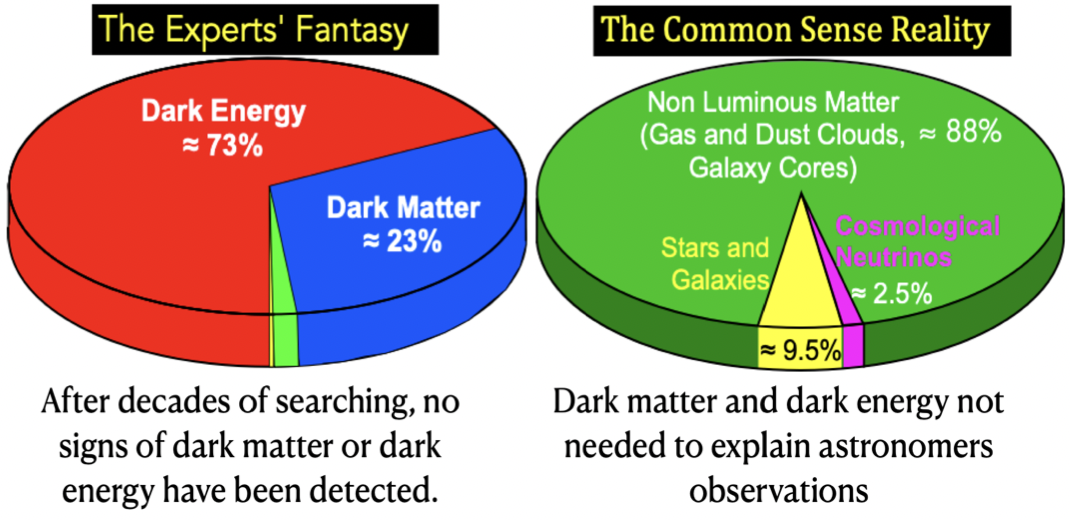
Out of that, I would like you to know that my intellectual capability is up there with the best. That also shows what can be achieved when reason and logic, that which should be called common sense, is understood. That is one of my achievements over my many decades of learning.
Everything in the universe functions by following its path or least resistance. That is how it is possible to work out what will happen in the future. Expected outcomes can be worked out using reasoned logic. Yes, it is common sense.
The same common sense that shapes everything in the universe, applies to the world of human behaviour. The common sense approach to life is one that takes us on a path of least resistance. But there is a catch. Life is a long journey. Our easiest pathway through it is not always what seems to be the easiest next step. Our path of least resistance is via wisdom, otherwise known as applying common sense to background knowledge. It enables people to recognize difficulties that may be encountered later, and plan to overcome them. Knowledge is best learned through education. Common sense can be learned through life experiences.
To help you understand how reason, logic and common sense work, these presentations cover two major themes, the social world of people and the physical world of objects
Over most of the past few thousand years, the world’s human population slowly increased at a rate of about 0.05% per year. For much of that period most people’s lives were short, uncomfortable, and frequently harsh. Disease, malnutrition, poor hygiene, and violence were among the ills suffered. Lives were shackled by ignorance, superstition, and oppression. On average women of childbearing age gave birth to 5 children. Over half died before they became adults.
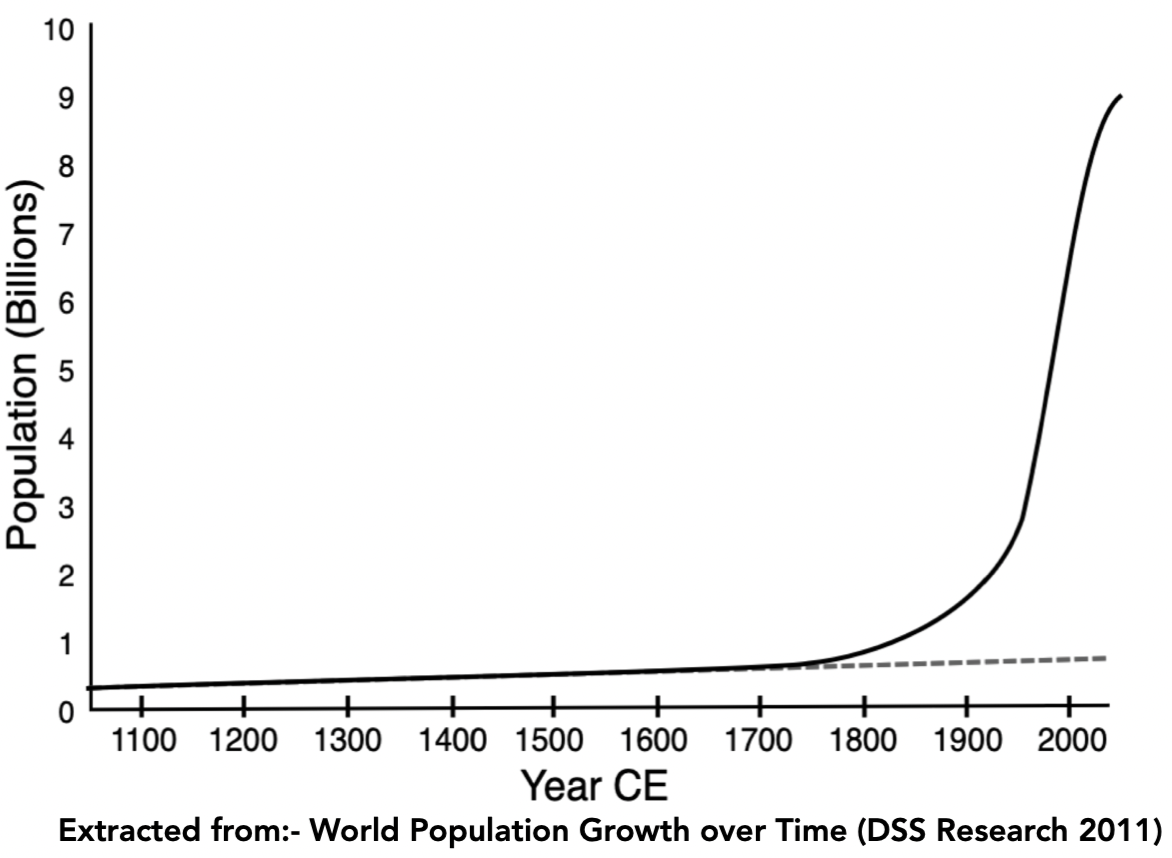
Throwing off the Shackles
In the 16th century CE, the English began to throw off those shackles. They introduced an enlightened Protestant interpretation of Christianity. Freedom of thought and speech were encouraged under a morality that included “respect the heavenly creator”. In other words, do things for valid reasons. Use reasoned logic, otherwise known as common sense. And “treat others as you would have them treat you”. The English changed their form of government from absolute monarchy to democracy. Ordinary people had a say in how they were governed. That was a total revolution. It limited government excesses and introduced modernity.
Their more enlightened, common sense, approach began to influence total human population about the beginning of the 18th century CE. The population growth rate increased from its earlier 0.05% per year, to reach a maximum of about 2.4% per year around 1975 CE. The reasons for that huge increase were the many common sense innovation introduced by modern western civilization, championed by English speaking countries. If it wasn’t for the English/British starting a common sense approach to life, the world’s population would now be about 750 million. Nine out of ten of us would not be alive today. Isn’t it amazing what a bit of common sense has done for humanity.
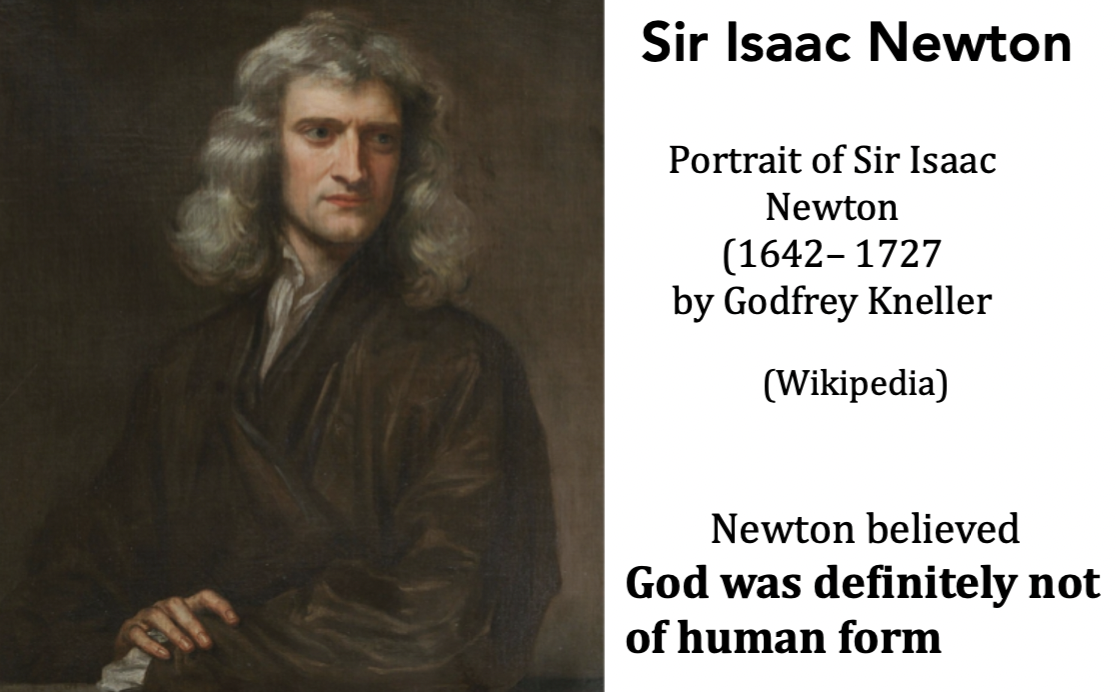
Respecting the “heavenly creator” is to work within “its” limitations. In the physical world, Sir Isaac Newton was the first person to study and describe those limitations. He was deeply religious and wanted to find out how the “heavenly creator, that which you call God”, thought. The term “it” is used, because Newton believed “God was definitely not of human form”. Many others held, and some still hold, that belief.
An early example of respecting the “heavenly creator’s” limitations in the physical world, was a quest for more mechanical power to get more work done. People innovated with steam engines and worked out how more power could be generated from smaller machines, using less fuel. They did that by working out what “the heavenly creator” allowed. They did not tell it how they wanted it to work.
Steam engines were used to drive machines that could produce more goods with less human energy input. They were the path of least resistance to cheaper and better quality goods. And a greater profit. Initially they were used to pump water out of mines and drive textile and other mills. Steam engines were far better than slave, child, cheap, or animal labour. Their use was common sense in action.

That was the beginning of the large-scale application of reason and logic in the real physical world. Steam power spread rapidly. Engines were made portable and adapted to move. They were heavy and needed special rails to support them. When designed, constructed, and operated correctly, they could move many passengers at “rapid” speeds over “great” distances. For 19th century people who wanted to travel significant distances over land, steam trains were the common sense choice.

”
The greatest era of the application of common sense with proven results in the physical world, was the English speaking people either side of and including the 19th century CE. The mechanical world after 1930 was totally different from that before 1770. They invented and/or developed all sorts of mechanical marvels. There were railways, steel bridges, steam powered steel ships, big industrial mills, cheap mechanically generated electricity, automobiles, skyscrapers, radios, telephones, heavier than air flight, and much more.
Throughout thousands of years of human history, no other time-period has seen such a huge change in mechanical engineering. That wasn’t achieved by people waving magic wands. It was people in democratic countries using logic and common sense to reason out how to do things better. Designers worked out common sense ways of doing things with machines such that their path of least resistance was to work as designed and constructed.
An aid to understanding how common sense works in the physical world, is found in large modern passenger aircraft. They are made from hundreds of tons of metal and other materials. They contain over a million individual parts. Each part must be made to exacting specifications and installed and serviced to demanding standards.

When that is done correctly, the path of least resistance for the fuelled and controlled aircraft, is to transport hundreds of passengers thousands of kilometres through the air at about 1,000 kilometres per hour. Passengers are delivered safely to their destination. Every year, billions of passengers trust their lives to all those associated with the air travel. They work well because people skilled in those engineering ventures use their expertise to make sure their equipment works in harmony with the natural ways of the “heavenly creator”.

Expertise in a particular field is applying common sense to background knowledge. Education is basically learning from past mistakes. Everything that went wrong in the past was designed out of new products. Designers and engineers became skilled in working out what could possibly go wrong in the future. They design those out as best they can.
All the modern technological marvels function because people work with the natural ways of the universe. Designers don’t tell the heavenly creator, or nature, how it should function. They find out what is possible and work within those limitations. Our modern technological world is a great example of what people can achieve when reason, logic, and common sense are used the real physical world.
Those developments did not happen by the slow evolution of ideas throughout the world. They occurred rapidly in Western Europe in general and the British Isles in particular. The Americans and others were quick to adopt and improve on those ideas.
The modern technological world is a great example of what can happen when people work with the natural ways of “the heavenly creator”. Reason, logic, and common sense must be applied in those technology fields, or they won’t work!
The words “With the heavenly creator, all things are possible” are very appropriate.
The Social World of People
But what of the social world of people with real life situations? Politics, history, health, economics, education, welfare, personal comfort, religion, everyday life, and similar.
For the thousands of years of recorded human history, wars and conflict have been part of the human activities. Between 3,000 BCE and 2,000 CE, there was a large change in human technology, mostly post 1700 CE, but not much change in human conflict. It is true that conflict deaths post 1950 CE were diminishing.
However, that comes after the bloodiest conflicts in history over the previous century. The major ones were China’s Taiping rebellion, World wars 1 and 2, the Russian and Chinese civil wars, and their aftermath. Add to them the possibility of mass destruction through nuclear war and you will see there has not been a “long term” change in humanity’s trend to avoid conflict. Where is the common sense in that. It is just one indication that reason, logic, and common sense have not been widely used in the fields of human activity. There are many others.
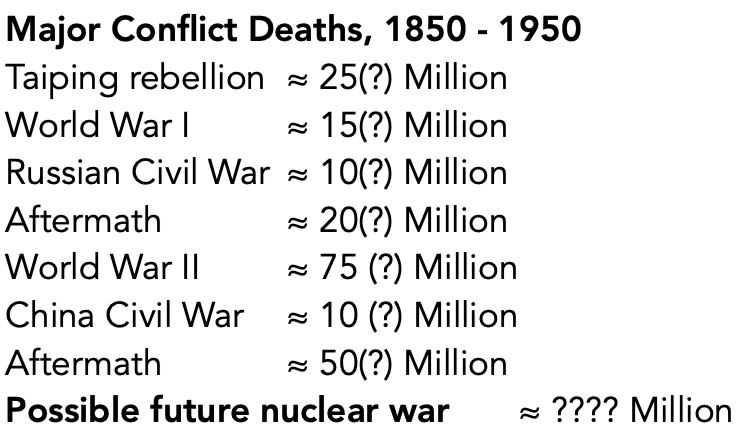
The social area of human behaviour is where the saying “Common sense is a rare commodity among modern humans” applies. To understand why, we should start with that old saying “History repeats itself”. There are a couple of features about humanity that have been common over the ages.
Throughout history, most people’s greatest fear was that of unexpected premature death. People did whatever they could to avoid it. Most still do. Modern health care and other benefits have done much to avoid it for most people. Most of humanity’s next greatest fear is associated with common sense. It is difficult to work out which aspect is feared the most. It is somewhere between being told what common sense is and being asked to use it.
Humanity’s first introductions to the phrase “common sense” was in England about the 14th century CE. People from the same region had similar values. They had a common “sense of security”. People knew how others within the community would act for the common good. Over the years, its meaning slowly changed. People doing tasks usually chose the easiest way to do them. It was the “common sense” thing to do. Now-days, common sense is most often expressed as “sound judgement based upon logical reasons”. Its use by the English speaking people, and some other westerners in the 18th, 19th and early 20th centuries, laid the foundations of our modern technological world, complete with all its advantages.
When it comes to human activity, common sense was first introduced about the 14th century BCE. It wasn’t even known as common sense. It was often referred to as the “will of the only true God”. Yes! It was Moses. His message is recorded in The Pentateuch, the first five Books of The Old Testament. It wasn’t fully recorded until about one thousand years after His death. That gave plenty of opportunity to distort His original message. Despite that, some of the common sense that was the core of His message was retained. It is still there for all who want to recognize it.
In The Pentateuch, Moses made it clear that, as well as “creating the heavens and earth”, God also controlled them. That made Moses’ God, the “creator and controller of the heavens and earth”. Moses gave many logical, common sense laws, to obey to benefit from His teachings. Read The Pentateuch from Exodus Ch 20 to the end of Deuteronomy. If you understand common sense, you will find lots of it in those words attributed to Moses.
Moses continually referred to God as He! Of course He did. In those ancient times, there were no gender neutral pronouns like “it” to express a non-gendered “entity”. Everything was referred to as he or she. Male and female entities were given names. Gender neutral “entities” were given titles. Moses was recorded as referring to the monotheist God as YHWH, pronounced Yahweh. It translates into English as “I am (what I am) – a title. He was not talking about God as a Man Being Deity!
Gender neutral terms like “it” appeared first in the English language about the 13th century CE. Other languages have adopted similar terms. Even today, two of the great religious languages, Arabic and Latin, do not have gender neutral pronouns.
As for common sense, look at The Ten Commandments.
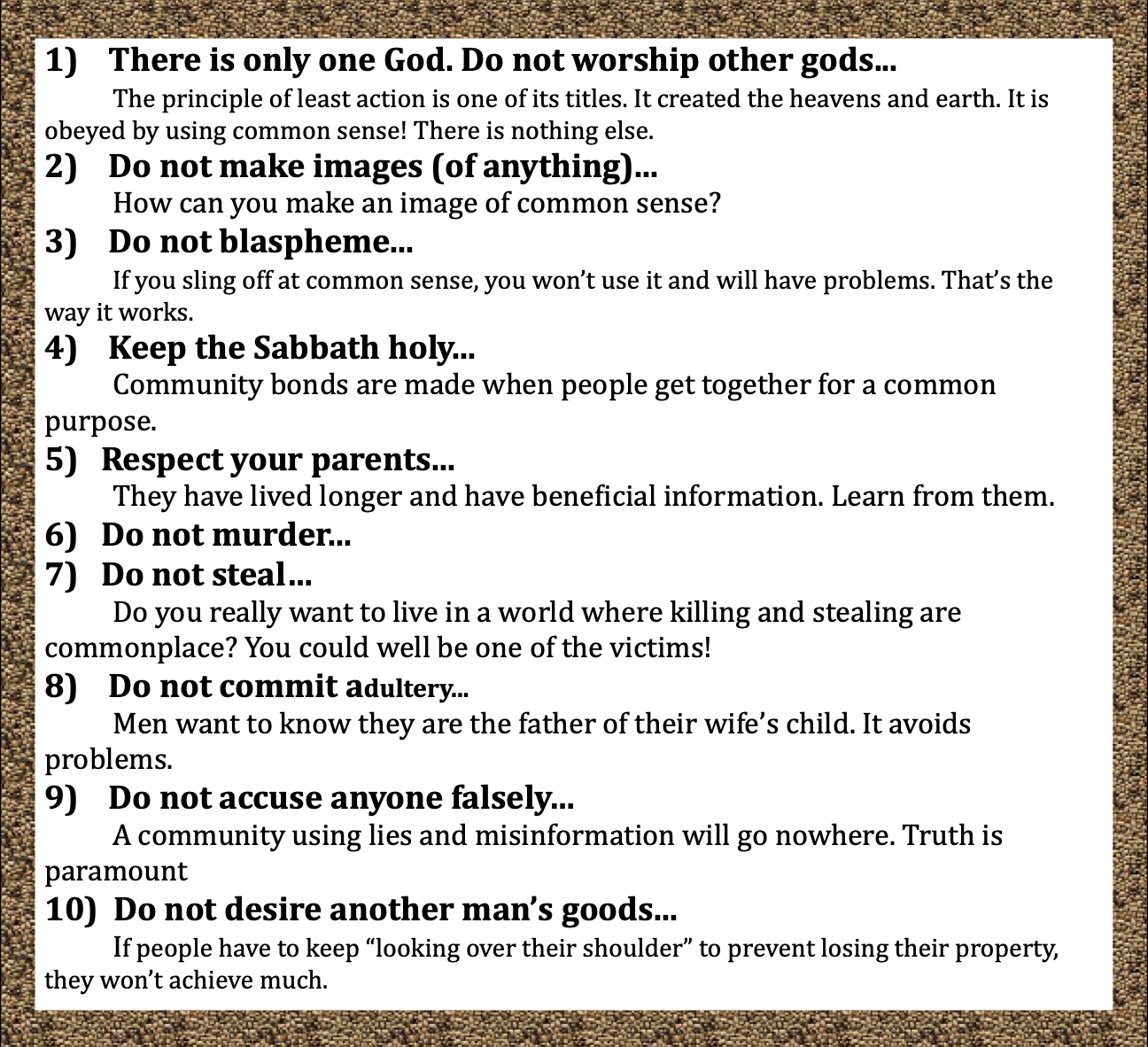
The whole point of Moses’ teachings was that of a reasoned, logical way for humans to live in harmony with the natural world and each other. He taught of such things as hygiene, what to eat and what not to eat, agricultural practices, treat all people equally, use correct weights and measures, and so forth. You would be rewarded by a better or longer life if you followed His rules. If you ignored or went against them, your nonsense actions would see you worse off. That is your punishment.
That is how common sense rewards you and the lack of it punishes you. It still applies these thousands of years later.
Three hundred years after Moses’ teachings, the Israelites use of common sense culminated in the reigns of the great kings David and Solomon. Israel was a strong regional power, just as Moses promised in Deuteronomy chapter 28, verse 1. “If you obey God and faithfully keep His commands, He will make you greater than any other nation on earth”. Reworded, it means those who use logic in an illogical world, will be more powerful than all other people. That was an early example of reason, logic, and common sense benefiting some humans.
Soon after Solomon’s death, the Israelite clerics changed devotion to God from the reason and logic that supported common sense morality, to prayer and ritual to Yahweh. By then He was interpreted as a Man Being Deity they called the Lord or the Blessed one. Their fortunes declined. Israelite unity split. A couple of hundred years later they were attacked by the Assyrians. Ten of their twelve tribes vanished.
A little later the remaining tribes of Judah and Dan, were captured by the Babylonians. After 60 years as slaves in Babylon, Cyrus of Persia, who had a belief in a single God of good, released them. On their return to Jerusalem, they set about putting the story of their God, as they saw Him, into words. Those words are recorded in The Old Testament. It took about 250 years to compile. The authors gave careful thought to make sure they did not offend “The Lord”, their name of what they believed was a Man Being Deity.
They did not use their freedom wisely. Within 100 years they were captured by the Macedonians and later the Romans. Three unsuccessful rebellions against Rome saw them expelled from Judea about 135 CE. It was another 1800 years before their descendants returned in any number. That was not really the future Moses promised. They did not obey the logical aspects of His teachings and paid a very high price.
The next great scholars to emphasise morality were Confucius and Siddhartha Gautama, the Buddha, about the 5th century BCE. Confucius emphasized personal and government morality, correctness of social relationships, justice, friendship, and sincerity, among other acts of human kindness and common sense.
The Buddha taught of a “middle way”, a moderation, that would lead to a state of enlightenment, known as “nirvana”. To Buddhists, the fundamental law of the universe was that of “karma”. “Good actions produced good outcomes; bad actions produced bad outcomes”.
Different teachers, different times, different regions of the world, the same message. Good morality was important for human existence. It is a code of behaviour which, if followed, would be humanity’s path of least resistance to an enlightened stable civilization.
Moral behaviour and acts of kindness were included in the beliefs of other religions. I leave it to their followers to add more.
Almost a thousand years after Solomon’s death, Jesus of Nazareth retold the Israelites, the important features of Moses teachings. He referred to God as “ab shamiyam”, “the heavenly creator, that which you call God”. The God to which Jesus referred was the same God as told in The Old Testament. It was “the creator and controller of the heavens and earth”. Through words like “wisdom and kindness, not animal sacrifices, and forgive and forget”, Jesus gave people who followed Him a “soul”! It was the inner core of their personality that made people decent humans. His two greatest commandments were “Respect the heavenly creator”. That is, use reason, logic, and common sense. And: “Treat others as you would have them treat you”. Really quite logical! They apply as much today as they did two thousand years ago, and will apply forever into the future. The world would be a much better place if only people knew and did!
Jesus’ teachings of the Kingdom of Heaven were about people living a logical lifestyle on Earth. It was based on logical reasons, what should now be called “common sense”. It resembled the Buddha’s idea of “nirvana”. Moses taught through commands. “Do this ..” “Do not do that ..” Hard and fast rules. Jesus taught through parables, examples of logic in action. The hope was that people would recognize the logic in His messages and adjust it to different circumstances.
His disciples and early followers recognized the logic of His teachings. They tried to spread it as widely as they could. They had sufficient success that the authorities felt threatened by His message. They had to silence Him. Despite His kind words, Jesus was executed because many people then, like now, have a strong dislike of common sense.
His disciples began to record His teachings about twenty years after His death. The story of His life, teachings and how His disciples spread the word, was not finalised until almost three hundred years after His death. Saul of Tarsus, Paul, Romanized Jesus’ teachings, making them more acceptable to the Romans. His writings make a significant part of The New Testament beyond The Gospels.
The New Testament was finalized when Constantine incorporated aspects of Jesus’ teachings into the basics of the Roman Empire’s belief system. Christianity was made the Roman Empire’s official religion. It involved changing ab shamiyam”, “the heavenly creator”, to “Abba Shamiyam”, “the Heavenly Father”. People were promised their soul would go to the Kingdom of Heaven after their death. There they would live for eternity “at one with God”.
Over the next thousand years, the Roman Church set about reducing the violence that was part of everyday life in the Roman Empire. At that time, violence was common in Europe, and most of the rest of the world. Western Europe’s dark and Middle Ages saw clerics introduce significant prayer and ritual to the Heavenly Father. Many of Jesus’ logical teachings were ignored.
For various reasons, the Roman Church hierarchy began persecuting Jews, foreigners, and insufficiently devout Christians in Inquisitions. Over several hundred years they imprisoned and stole the properties of about five thousand people per century and burnt alive about one thousand per century. Some suggest the figures were much higher. Burning alive at the stake was bad. Some of the brutality committed by others outside the Roman Church’s sphere of influence was much worse. For the sake of your sanity, you do not want to know the brutality that existed in other parts of the world at that time and for a long time after.
Do not try to pretend that brutality would have disappeared without Christian intervention. Mongol barbarity, killed about 40 million people in the early 13th century. It occurred about the same time the Church’s persecutions began. Despite those persecutions, Christian influence made a big difference.
Almost six hundred years after Jesus’ teachings, Western Christianity stagnated in a complexity of the trinity, three Gods in one, yet one in all three. One of those Gods had to be killed to serve a heavenly cause. And so on! Converts were hard to find.
It was against that background that Muhammad again taught there was only “one creator and controller of the heavens and earth”. He called it “al-ilah” in Arabic. It translates to “the god” in English. Lower case lettering and a title meant Muhammad was not referring to a Man Being Deity.
In the absence of any neuter gender pronouns, Muhammad referred to the god as He. He also referred to the sun as he and the moon as she.
There was a lot of logic in His message about the “creator and controller of the heavens and earth”. It included reforming aspects of local society. The thought of losing power through logical reforms was too much for many Meccans. They wanted Him dead!
Forewarned, Muhammad and His followers fled to Medina. There, many people understood and believed His reasonably logical messages. A few years later He returned to Mecca with a band of warriors. The Meccans were defeated. Muhammad lived the remainder of His life in Mecca. There He continued teaching more revelations.
Muhammad taught about a secular way of life in which people submitted themselves to living a life around reason, logic, and common sense. Those who understand common sense could read The Qur’an and find the many logical, common sense messages He forwarded. For example, “.. never will the god change the condition of a people, except that they change it themselves”, Süra 13, 11. Like Moses and Jesus before Him, Muhammad knew there were no miracles. Süra 2, 106, made it clear that “.. besides the god, you have no other helper or guardian”. The only helper or guardian you have is your ability to use reason, logic, and common sense to work out the right thing to do. That was the best for you in the future. He also taught much about social justice and science.
Muhammad requested people submit to the “will” or “ways” of al-ilah, the god, by being reasonable and using logic and common sense in their everyday life. The secular movement He founded became known as “Islam”, Arabic for “submit”. Why would you want to do things that made your life more difficult.
Realizing He was aging, Muhammad’s followers began recording His words as best they remembered them. The accepted version of His teachings was finalized soon after His death. It is recorded in The Qur’an. His followers had a modern, simplified description of the natural ways of the “creator and controller of the heavens and earth”. They took the logic of His message as far and wide as they could. Those who followed the message had significant advantages over those who did not. For almost eight hundred years, Muslims went through a golden era of prosperity, hundreds of years before the Europeans.
There are long lists of Muslim scholars who made advances in such fields as astronomy, architecture, chemistry, mathematics, medicine, optics, science, engineering, and more. These were done hundreds of years before they were “re-discovered” in Britain and Western Europe. The world’s first degree granting university was founded in Fez, Morocco, in 859 CE. England’s Oxford university was founded in 1096 CE. The world’s oldest education centre was Nalanda, in modern day India. Founded in 427 CE, it lasted until 1197 CE, a few years before England’s Cambridge university was founded in 1209.
After the fall of the Roman Empire, major parts of Asia, the Middle East and North Africa were socially and technologically hundreds of years ahead of anything in Western Europe at that time. Over that era, any suggestion that Western Europeans were genetically superior to all others, would have been “laughed out of town”. Western Europeans really were backward. At the time, many regarded Western Europe as the posterior end of civilization on the Eurasian land mass.
Soon after Muhammad’s death, His title for the “creator and controller of the heavens and earth” was changed from al-ilah, to the name Allah. Beginning about the 13th century CE, submission to al-ilah by using reason, logic, and common sense was overtaken by submission to Allah through prayer and ritual. Islamic fortunes declined. Prayer and ritual were considered essential if people wanted to ascend to heaven after death. Muhammad’s secular lifestyle became a religion. Islamic fortunes declined.
The above may seem as if I am delving into the world of religion. That is measuring it by today’s standards. In their time, each of those monotheist Prophets was founding a secular lifestyle based upon the reason and logic. They are the natural way of the “creator and controller of the heavens and earth”. The clerics who followed those Prophets, diverted their secular practices into religious beliefs. They swapped reason and logic for prayer and ritual. It was usually done on the promise of a life of eternal bliss after death. It gave clerics greater power over their adherents, and had significant consequences for humanity.
Do you really think that the followers of Jesus and Muhammad restarted their calendars because those Prophets were promising a life after death? During their era, many religions were making similar promises. They restarted their calendars because of the promise of a new and better lifestyle, one that was founded on reason, logic, and common sense, as we say today.
Islam’s golden era ended when events in Western Europe began changing the world forever. Through Inquisition and hierarchy corruption, the Roman Church was depraved. Some Western Europeans protested. They introduced common sense ways. Soon Western European countries dominated. Muslim countries were reduced to colonies or vassal states controlled by Western Europeans. That status remained until well into the 20th century.
England was the first country to adopt Protestant values. Freedom of thought was combined with Christian values of logic and kindness towards others. The English Channel, a strong navy, and their wider use of common sense, protected the English. Starting with the industrial and agrarian revolutions, the British developed a more common sense way of doing things.
Countries in Western Europe could see the benefits of adopting some of their ways. It was “adopt and expand on those values”, or be left behind. It was those common-sense ways that gave Western Europeans their advantages over others. Through international trade and colonization, they spread those advances to as many people who would accept them, as they could. The greater the distant from Britain to other countries, the less they were exposed to those values. More distant countries did not make the same technological and social progress.
Traditions remained traditions and were hard to erase. It took the Roman Church over four hundred years before it approved the last of Martin Luther’s demands, posted in 1517 CE. Similar attitudes existed in the inhabitants of colonized countries. In sparsely populated regions of the world, for example North America and Australia, colonization was done by overwhelming numbers of Europeans settling on land occupied by the small number of indigenous people.
No matter what their society failings, the indigenous people tried to maintain their traditions against the logic introduced to them by British settlement. In parts of North America that resulted in Indian wars until the locals were subjugated. The introduction of modern health benefits and way of life succeeded in increasing both the number of indigenous people, their health and average longevity. In Australia, small numbers were killed by settlers. Throughout the colonized world, the great majority of indigenous deaths were due to the locals having little resistance to European diseases. Those who adopted some logical western values had increased health, longevity, and lifestyle comfort.
South Asia had a similar relationship to Asia as did Europe. Both regions were peninsulas separated from the main Asian landmass by a mountain range. Both had large populations that were a collection of different countries, each with their own beliefs, languages, and customs. Like Europe, conflict between them occurred. Casualties during those conflicts were often high. The British East India Company administered the regions they captured for trade and profit. The British government took over in the 1860s.
Their administration included getting rid of unsavoury practices like suttee, a wife having to throw herself onto her late husband’s funeral pyre; and thuggee, organized bands of people who killed and plundered travellers and others. Individual devotees were called thugs. That title is now widely used throughout the world to describe people whose activities were brutish. While that may portray south Asia in a poor way, it is more because it was documented and eliminated, than because poor practices were confined to that area. Brutality in other regions was worse for longer.
There were unnatural deaths due to rebellion and famine during British rule. They were small compared to the conflicts prior to and after British presence. Railways allowed the rapid transport of food to famine affected areas. They also united the sub-continent by making travel easier.
Upon gaining independence, India decided to keep much of the British administrative system. They adopted English as the language of national government. They are a united country, a feature Europe never achieved. Their prospects for the future are looking good.
By 1900 CE, Western European values, led by the British, were dominant. It had nothing to do with the pale colour of their skin. It had everything to do with their much greater use of common sense and Christian morality. Among the great health improving innovations they developed were vaccination against smallpox; the widespread use of soap and improved personal hygiene; the distribution of disinfected and tested water through pipes into households; the transport and treatment of human waste prior to disposal; among many others. Combined with the agrarian revolution’s greater food production, the industrial revolution’s greater productivity, and the mechanical generation of cheap electricity, they did the most to increase human health, longevity, and lifestyle comfort throughout the world.
The story of the British Isles is noteworthy. Their population was never much more than two percent of the world’s people. For much of the 19th century CE, they were by far the world’s most powerful country, militarily and economically. It is true they had advanced technology. But their technology was copied. The major factor in British dominance was their greater use of reason and logic. That was combined with Lord Nelson’s comment “England expects every man to do his duty”. On average they knew the “right thing to do”, more often than did their foes. Militarily they defeated much larger opponents. By the early 20th century, they directly influenced one third of the world’s people and land area. Much of the rest of the world adopted some of their ways to modernize.
The British colonized mostly by administration, North America, Australia, New Zealand and South Africa excluded. In Africa, they wanted to unite the continent with a railway connecting the north to the south.
By 1900 CE, Britain, the United Kingdom, was the most powerful country in the world. It achieved that status because the average of their actions had more reason and logic associated with them than any of the others.
In that way the British fulfilled the promise made by Moses over three thousand years earlier and stated in Deuteronomy, chapter 28, verse 1 “If you faithfully keep the commands I am giving you, God will make you greater than any nation on earth”.
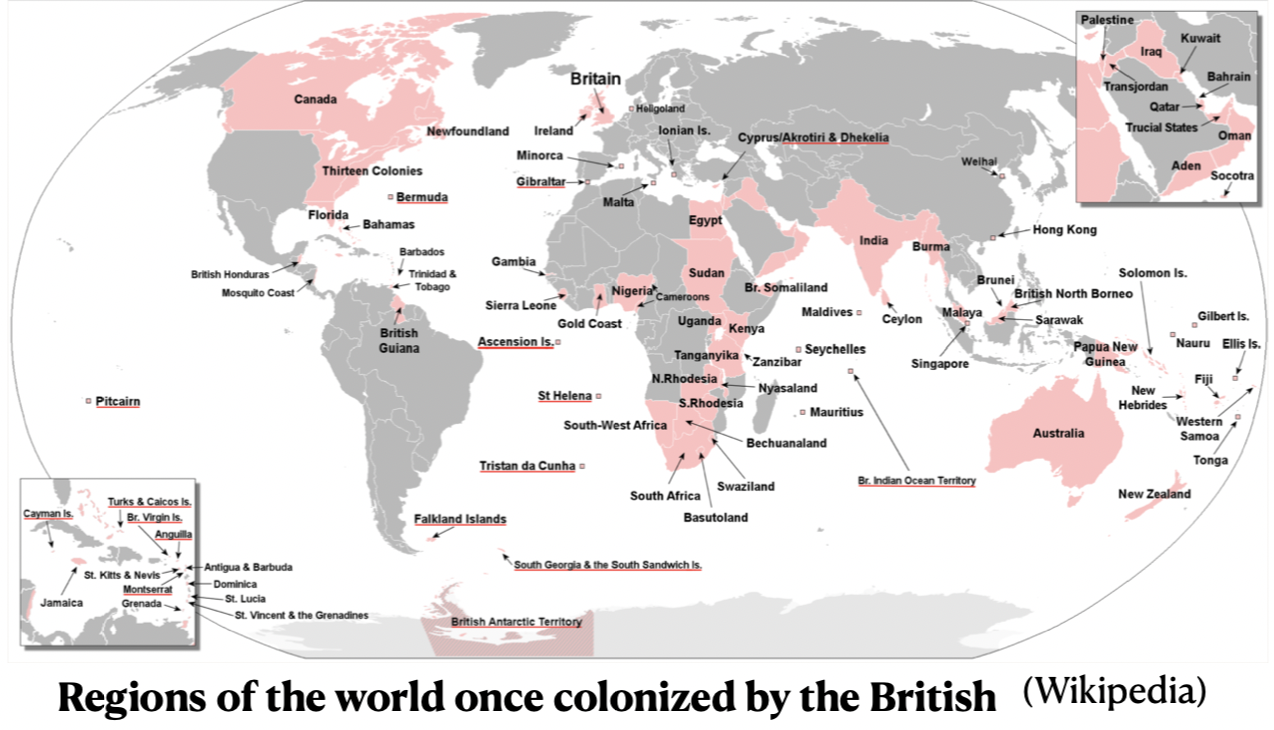
They are no longer the world’s most powerful country. Countries with larger populations and resources adopted their ways, improving their own capabilities.
The world was too primitive during Moses’ time for His teachings to have any opportunity for his early followers to understand and practice logic and common sense. Although more advanced during Jesus, time, superstition was still too high for His small number of followers to fully sway the Roman Empire.
Those who think it was superior British technology that gave them their advantages should look at the world around 1,100 CE. The Chinese Song Dynasty was industrialized. It had paper money, an organized banking system, a merchant navy that was trading internationally, among other advances. Islamic science and technology were hundreds of years ahead of anything in Britain and Western Europe. Their land base trade routes spread from western Europe to China. At that time, the populations of both regions were innovative and profit oriented. Neither of them converted their advances into modernity. Britain only reached similar advances after the mid 18th century CE.
The British advantage was the freedom of thought given to individuals and greater use of logical common sense. Their democratic system prevented government excesses. With their Judeo-Christian morality, they knew the “right thing to do”. That was the British advantage that allowed their 2% of the world’s population to successfully govern one third of the world’s people and land area and positively influence much of the rest as they adopted modern practices.
Their influence showed up in other ways. Slavery was widespread in the Ancient and Middle Ages worlds. The Western European countries were the first to ban it and enforce the bans. The success of those democracies slowly influenced other countries. Russia’s Tzar Alexander released Russian “peasants” from their serfdom, or slave status, in the 1860s. Middle Eastern countries were shamed into getting rid of their slaves by the middle of the 20th century CE.
Through aid agencies, Western countries provide help to people in less developed countries, as needed. They built infrastructure, provided food during times of famine, assisted with medical aid in natural disasters and with medical assistance during disease outbreaks. All that on top of providing infrastructure for clean water, sanitation and regular medical benefits.
English language inspired modern western civilization has kept more people alive, free, and further removed from poverty than all the other system in the world’s history combined. Was it really such a bad record? Despite those unparalleled successes, there are those who desire to bring down the system, both from within and without. They are just the latest in a long line of people with this intense dislike of common sense.
Internally, a significant number of groups are protesting against perceived injustices. Most have three features in common, a lack of knowledge of history, very little common sense, and a distinct dislike of it. They go under the collective heading “woke” in the mistaken belief they have “woken” to an awareness of modern western civilization’s perceived injustices. Their main participants are young adults of average university student age. Their demands include political correctness, suppression of free speech and “toe the party – oops – official line”. They are passively supported by some universities with barely a murmur of opposition from academics or university heads. This does not mean universities are the originators of “woke” ideas. They don’t object to them.
The woke have so little understanding of common sense that they call their movement progressive. They cannot see that their activities are regressing societies. A look around the world shows social unrest is increasing, the silent majority is experiencing greater financial stress and hardship. Life expectancies in some western countries are starting to decline. Conflict deaths are increasing throughout the world. The threat of nuclear war has never been higher. Totalitarian leader(s) losing military or economic situations threaten to use nuclear weapons if their military tactics fail. They are not progress!
Universities are the main trainers of schoolteachers and journalists. Teachers are passing woke ideas on to their young students. Education standards are falling. Many journalists bias their reporting on woke ideas and convey that message across to their audience. Their reporting is so biased, that many refer to anyone trying to bring common sense into a conversation, as a “right wing extremist”.
Universities are the ultimate educators. If education standards at any level within a country are falling, they are the ones who should be most concerned and take steps to improve them. Some could ask if university academics collectively have enough common sense to both recognise the falling standards and take steps to reverse them!
The woke make full use of unregulated internet social media outlets to use false names and false addresses to write comments that would be barred from mainstream print and electronic media outlets. They create the impression that their ideas are popular with the public, reinforcing them by harassing or cancelling anyone who doesn’t agree with them.
One of their great successes was getting governments to enact legislation that “Truth is no defence” in some legal situations. Witnesses swearing to “Tell the truth, the whole truth and nothing but the truth” has been a cornerstone of our justice system for hundreds of years. No objections from the legal profession.
Common sense is disappearing fast.
Universities now have access to almost half the young adult population, to indoctrinate – oops – educate, as they see fit. People could try asking universities to revert to common sense, freedom of thought and speech, and generally improve the standard of education in the country. Their answer is predictable in the negative. The universities want their independence and demand government funding. Governments would find it difficult to cut funding. Meaningful reform soon seems unlikely.
The group that first forwarded ideas of logic and common sense, were monotheist clerics. Until about 1900 CE, many Christian clerics were active in the study of the natural ways of the heavens and earth. Studies in geology and botany could be done almost anywhere with little more than a small microscope. Early 20th century science advances established there was no need for a Man Being Deity to explain the heavens and earth. Modern Christian clerics insist that God is the Heavenly Father, not the heavenly creator. People are leaving churches in in increasing numbers. The morality of the population is in decline.
Many clerics think it an enormous loss of faith and face to accept the scientific interpretation of the “creation and control of the heavens and earth” and that God is not a Man Being Deity. They should have no fear. The scientific interpretation of the Big Bang as the formation of the heavens and earth is totally ridiculous. The “experts” know the odds of the universe surviving so long after the Big Bang are about 1 in 1060. Those odds are zero. The strange thing is that the experts who believe it is the only possibility, interpreted a plus sign derived by Einstein as a minus sign. Reverting to the correct sign shows the universe has always existed. The heavens and earth, as seen by the ancients, were formed, or created, out of it by “the heavenly creator, that which you call God”.
It is timely to have a look at some of the pillars of the different belief systems to see how their experts distort small molehills into insurmountable mountains. In science, the Big Bang theory, dark energy, and dark matter are now regarded as pillars of modern science. The Big Bang theory is based upon world’s best experts interpreting a plus sign Einstein derived as a minus sign when it was inverted.
Dark energy, like the Big Bang theory, relies upon that incorrect interpretation of Einstein’s plus sign. The proponents of dark matter do not understand Newtonian mechanics, forwarded in 1687. They use the wrong mathematics.
I would not like to be in those “experts” shoes when some students get up sufficient courage to question them as to the simple errors they made. Going on past performance, they would dismiss the students, rather than investigate vigorously.
That God is a Man Being Deity, is a pillar of modern monotheist religions. In the Christian religion, the difference is two letters, b and a, between “ab” creator, and abba, father in Aramaic. Jesus taught that ab shamiyam, “the heavenly creator” was “the creator and controller of the heavens and earth”. Christian clerics now teach about Abba Shamiyam, the Heavenly Father, a Man Being Deity.
In Islam, the difference is between lower case al-ilah and upper case Allah and dropping dash i. Muhammad taught that al-ilah, “the god”, was “the creator and controller of the heavens and earth”. Islamic clerics now teach about Allah, perceived as a Man Being Deity. Prayer and ritual are required to have eternal life after death.
They are very minor differences that “experts” have seized upon to their advantage. In science it is about making everything seem as difficult as possible so they can portray themselves as geniuses. A favoured tool is mathematics. Make the maths as complex as possible. Ordinary people have no option but to believe them.
Maths doesn’t make things happen. Actions happen for physical reasons. When “experts” forward ideas that don’t make sense, ask for a physical explanation. Wishy washy explanations should not be accepted.
Monotheist clerics have converted the secular logical lifestyle taught by their Prophet into a religion. Pay homage to a Man Being Deity by prayer and ritual to secure an everlasting life in heaven after death. Morality was about securing that life. With very limited proof from their Prophet’s recorded message, the clerics manipulated their followers into believing they offered that pathway. With short and often harsh lives, people in earlier times were willing to give clerics money and control over their life in exchange for an eternity of improved conditions.
The above has outlined how the logical teachings of the Prophets greatly improved earthly life. That pathway was because some people had faith in Jesus’ teachings about logic and common sense being the way of the heavenly creator. That Christianity is now the world’s most persecuted religion is just another indication of much of humanity’s dislike of reason, logic, and common sense.
Science, religion, politics, morality, law, indeed all aspects of human life should be based upon reason, logic and common sense. It does not matter by which title it is called. The will of the only true God, or ab shamiyam, the heavenly creator, even al-ilah, the god, perhaps karma, or the force, or any other title. It has no favourites. It takes no side in any conflict. People who choose to work with it will benefit. Use reason and logic in your life and things will improve. Choose to ignore it or go against it and you will not fare well. It is your choice. Nobody can make it for you.
Competition drives progress. There should be a competition between humans to see who can come up with the most common sense way of doing things. Post 2020 CE the main competition seems to be who can introduce the most illogical ideas. There is no clear winner. The ideas get further removed from sanity. Humanity’s morality and social progress are the clear losers!
It is over 3,000 years since humanity’s first introduction to the benefits of reason, logic and common sense. As outlined above, history has shown how people prospered when they used them and went backward when they discarded or ignored them.
After humanity’s greatest period of technological and social gains in its history, there are strong movements to remove as much reason, logic and common sense from humanity’s life as is possible. Thus the saying, “common sense is a rare commodity among modern humans”.
Those who feel they are oppressed or disadvantaged, are in that situation because they don’t, or don’t want to, understand the logic and common sense that underpins our modern beneficial world. Demanding the right to continue traditional values will not improve your situation. Improvements, i.e., beneficial change will only come by adopting common sense values into your cultural background.
The benefits of using reason, logic and common sense are around for all the see. Some may understand Jesus’ frustration when he said: “There are none so blind as those who will not see“. “There are none so deaf as those who will not listen“. “There are none so lame as those will not follow“.
Is it any wonder that Christians are now the most persecuted religious group in the world?.
